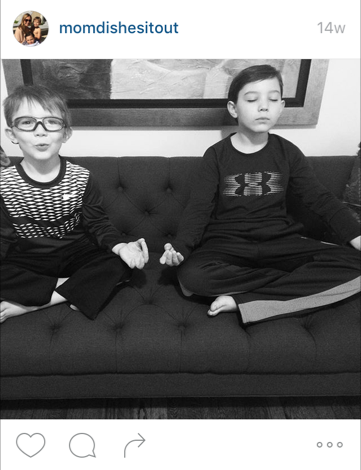By Laura Cipullo, RD, CDE, CEDRD
How to get your kids to chill out
Kids are stressed out, and really, who can blame them? There’s the pressure to do well in school; to juggle household chores, a social life and extracurricular activities; to fit in with classmates; and to handle all the issues that come with a changing body. Managing that stress is important for feeling good in the moment, and the future: A recent University of Florida study found that kids who experienced three or more stressful occurrences were six times likelier to have physical or mental health issues or a learning disorder than those who did not.
Science backs the benefits of mindfulness when it comes to reducing stress and improving overall health. The University of Massachusetts School’s Mindfulness Program found that mindfulness leads to a 35% reduction in medical symptoms and a 40% reduction in psychological ones. Eating disorders are one example of a psychological issue that can be helped through mindful eating. According to Dr. Susan Albers, “During the past 20 years, studies have found that mindful eating can help you to reduce overeating and binge eating, lose weight and reduce your body mass index (BMI) and cope with chronic eating problems such as anorexia and bulimia, and reduce anxious thoughts about food and your body.”
It doesn’t take long for mindfulness to show a result, either. Carnegie Mellon found that as little as 25 minutes of mindful meditation for three days helped stress. Yoga and meditation specifically help decrease stress hormones, such as cortisol and epinephrine.
Mindfulness programs for kids are growing
With all the research showing the benefits of mindfulness, it’s little wonder that schools are catching on and incorporating the concept on a regular basis. A recent Washington Post article reported on how public schools are teaching the concept of mindful eating. Children are getting in tune with their body’s hunger signals, learning to enjoy the flavors of food, and respect the cues the mind/body are relaying to them; they are also learning to respect what they are putting into their bodies, and to respect their bodies as a whole. This all can help prevent eating disorders in middle-school children, a population at high risk for these issues.
In the wake of the Newton tragedy, Dr. Stuart Ablon of Massachusetts General Hospital was brought to New York schools to conduct seminars for 3,000 school safety agents and police officers. Mindfulness — getting children to acknowledge and resolve their feelings — was a key component of the anti-violence program, as was yoga. The goal was for these agents and officers to talk to troubled children before resorting to punishing them.
Mindfulness and meditation are also becoming a part of private school health classes, as the Wall Street Journal recently reported, and are used to strengthen children’s all-around emotional and intellectual wellness.
Spafinder took note of the Oakland-based Mindful Schools, a program that shows adults how to teach mindfulness to K-12 youth, helping over 300,000 children so far.
Beyond schools, mindfulness and general wellness for kids is taking center stage at hotels, spas and resorts, offering children a way to unwind at the same time their parents are enjoying a well-earned vacation.
And don’t forget to check your local meditation or yoga studio! You may be surprised to find they have children’s classes too (like MNDFL, a New York meditation studio not far from my new office). New York even has its own yoga studio just for kids. I recently filmed a news segment there on the very topic of mindfulness for children.
Relaxing is for parents too
And while all these mindful-based resources are great for kids, it doesn’t mean kids will forge forward without parental support. I ask parents to take responsibility and please introduce, then maintain, mindful experiences at home. Breathing work, meditation apps, mindful eating (check out my books Healthy Habits and Women’s Health Body Clock Diet for more info) and mindfulness meditation are the most studied and effective strategies in the adult population and therefore a great place to start with the kiddies! Leading by example is also important. Consider how you role model gratitude, body acceptance, compassion and mindfulness in your own life. On a personal note, to aid in my own mindfulness journey and lead by example for my children, I decided and am now almost through my own yoga teacher training to become a Registered Yoga Teacher!








